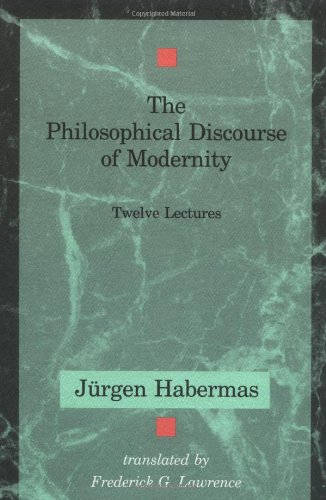The Philosophical Discourse of Modernity ebook download
Par barrientez carol le lundi, juin 13 2016, 07:50 - Lien permanent
The Philosophical Discourse of Modernity by Frederick Lawrence, Jurgen Habermas, Thomas McCarthy


The Philosophical Discourse of Modernity download
The Philosophical Discourse of Modernity Frederick Lawrence, Jurgen Habermas, Thomas McCarthy ebook
ISBN: 0745608303, 9780745608303
Format: pdf
Publisher: Polity Press
Page: 456
[1] Jürgen Habermas, “An Alternative Way out of the Philosophy of the Subject: Communicative versus Subjective-Centered Reason,” pp. Thus, on this line of reasoning, in the early twentieth century German philosopher Martin Heidegger theorized modernity as a huge system of “enframing” that reduced things to mere objects and functions available for human use. Lawrence (Cambridge, Mass: MIT Press, 1987). To be captured by Derrida and Habermas in their respective critiques of Foucault (Derrida in the back and forth beginning with Cogito and the History of Madness, Habermas in the Philosophical Discourse on Modernity). Exploring the Modern: Patterns of Western Culture and Civilisation, Blackwell, Oxford, 1998. 294-326, from The Philosophical Discourse of Modernity (trans. William Burroughs Baboon has started reading Habermas' 1987 text, The Philosophical Discourse of Modernity: Twelve Lectures. Jürgen Habermas, 'The Philosophical Discourse of Modernity' (1985). Aletheia [unconcealedness; truth] could be the word that offers a hitherto unnoticed hint concerning the essence of esse [to be]. An attempt at a reevaluation of Neo-Kantianism, on the contrary, is to be found in Jiirgen Habermas, The Philosophical Discourse of Modernity, trans. Modernism as a Philosophical Problem, Oxford, 1991. And the Dialectic of Reason, was indispensable for a new generation of scholars trying to make sense of Habermas' two-volume Theory of Communicative Action (1981) and his Philosophical Discourse of Modernity (1984).